 Petzlover
Petzlover Czechoslovakian Wolfdog is originated from Czech Republic but Sarplaninac is originated from Macedonia. Both Czechoslovakian Wolfdog and Sarplaninac are having almost same height. Czechoslovakian Wolfdog may weigh 19 kg / 41 pounds lesser than Sarplaninac. Both Czechoslovakian Wolfdog and Sarplaninac has almost same life span. Both Czechoslovakian Wolfdog and Sarplaninac has same litter size. Both Czechoslovakian Wolfdog and Sarplaninac requires Moderate Maintenance.
Czechoslovakian Wolfdog is originated from Czech Republic but Sarplaninac is originated from Macedonia. Both Czechoslovakian Wolfdog and Sarplaninac are having almost same height. Czechoslovakian Wolfdog may weigh 19 kg / 41 pounds lesser than Sarplaninac. Both Czechoslovakian Wolfdog and Sarplaninac has almost same life span. Both Czechoslovakian Wolfdog and Sarplaninac has same litter size. Both Czechoslovakian Wolfdog and Sarplaninac requires Moderate Maintenance.
 The Czechoslovakian Wolfdog is a mix between a German Shepherd and a Carpathian wolf. In fact the Czechoslovakian Vlcak is another name for the Czechoslovakian Wolfdog and Vlcak is the Czech name for a German Shepard dog.
The Czechoslovakian Wolfdog is a mix between a German Shepherd and a Carpathian wolf. In fact the Czechoslovakian Vlcak is another name for the Czechoslovakian Wolfdog and Vlcak is the Czech name for a German Shepard dog.
When you translate the name, it means Czechoslovakian German Shepherd. There was a biological experiment that began in 1955 and these experimental breedings went on for a decade, so that in 1965 a plan was created for the breeding of this new breed.
It was in 1982 that the Czechoslovakian Vlcak was recognized as a national breed in the former Czechoslovakian Republic and recognized by the United Kennel Club in 2006.
This attractive, intelligent looking dog won the title of ‘World Champion’ at the World Dog Show in 1990 and in 1999, the breed met all criteria of the World Canine Organization, earning full recognition of the Czechoslovakian Wolfdog breed.
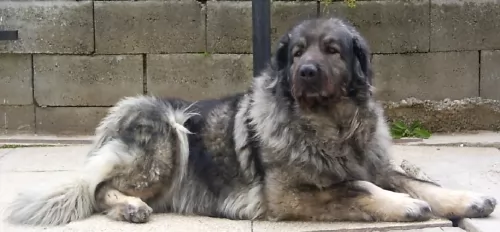 Hailing from Macedonia, the beautiful Sarplaninac dog was developed as a guardian of livestock and is large enough to fight off large predators like bears and wolves.
Hailing from Macedonia, the beautiful Sarplaninac dog was developed as a guardian of livestock and is large enough to fight off large predators like bears and wolves.
Nobody is too sure of the breeds exact origins, though it is thought that its ancestors came to the Balkan Peninsula with people migrating from ancient Asia.
This huge dog is one of the oldest native breeds from ancient Molosser breeds. The dog was recognized in 1939, and in 1954 it became known as the Yugoslav Shepherd Dog. Later the name changed and the dog was recognized by the United Kennel Club in 1995.
 The Czechoslovakian Wolfdog looks like a true German Shepherd/Wolf mix with his erect ears, bushy tail and straight, muscular legs.
The Czechoslovakian Wolfdog looks like a true German Shepherd/Wolf mix with his erect ears, bushy tail and straight, muscular legs.
The eyes of the dog are slanted and brown. He stands at about 65cm in height and weighs up to 26kg. The thick coat of the dog is greyish in color but other colors come in as well such as white, cream, black, silver and yellow - all wolf colors. In fact the density of the coat as well as the color changes according to the seasons.
The coat is particularly thick in the Winter, thinning out in the Summer. The coat color may be yellow-gray or silver-gray.
Having a pet which has some wild animal mix can be risky and dangerous. Adding wild animal DNA means that you can get some of the behavior of the wild animal added in and this can be asking for trouble.
When the Czechoslovakian Wolfdog turns on a person, he will be blamed and put down, whereas it is the stupidity of the human to breed such dogs and bring them into their homes in the first place. You need to be careful with children in the home, especially if they don’t know how to treat a dog with respect.
Nonetheless the Czechoslovakian Wolfdog is able to develop a deep relationship with his owner. He is a dog who, when training and socialized, can gets on well with his human family as well as with other pets in the family.
He has got other excellent characteristics such as being fearless and courageous. He is intelligent and learns easily.
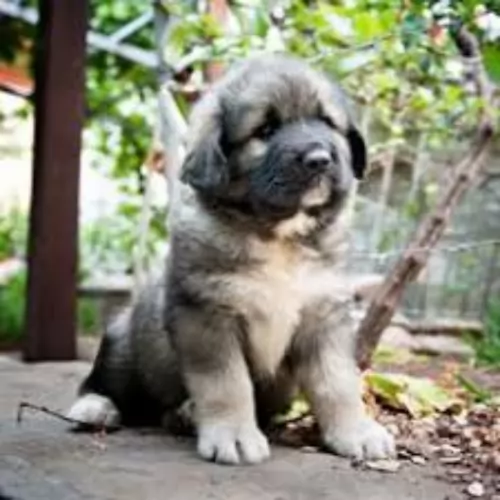 The Sarplaninac is a large, strong, fluffy dog standing at between 54 and 62cm in height and weighing between 30 and 45kg.
The Sarplaninac is a large, strong, fluffy dog standing at between 54 and 62cm in height and weighing between 30 and 45kg.
The coat of the dog is dense, coarse and of medium length. Colors are different shades of grey, white, tan and black. The head is large, the ears are fairly short but are floppy and covered with short hair. The dog is deep chested and the tail is long, often held high and covered with thick, feathery hair.
Protective, reliable, reserved, stubborn and gentle, this intelligent dog is fairly serious, and while he makes a devoted family pet, he is cool and wary of strangers.
Excellent training and socialization makes him well mannered, balanced and obedient around different people. He will tolerate children but won’t take easily to other pets in the house, capable of becoming aggressive with them.
 The beautiful Czechoslavakian Wolfdog resembles a wolf and in many of these dogs, their characteristics are wolf-like too. The dog is confident and independent, but it also able to form good relationships with his human family.
The beautiful Czechoslavakian Wolfdog resembles a wolf and in many of these dogs, their characteristics are wolf-like too. The dog is confident and independent, but it also able to form good relationships with his human family.
Many people thrill at the idea of having a pet which has a wild side to him, but there is a price to pay for having such a pet in your home. Their wild side can suddenly come to the fore, with dangerous consequences.
There are so many dog breeds to choose from that surely it isn’t necessary to start tampering with animals from the wild?
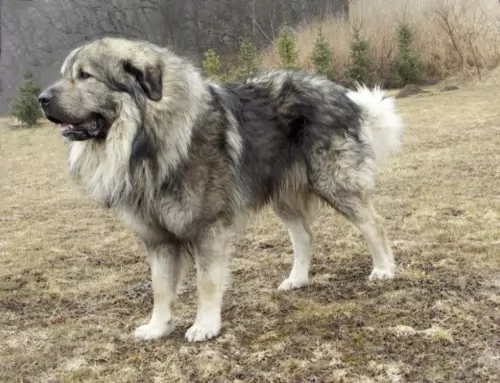 These dogs are protective, but they’re not vicious. When properly raised they are wonderful family pets.
These dogs are protective, but they’re not vicious. When properly raised they are wonderful family pets.
True, it’s a large, strong willed dog that isn’t a good choice for the first-time dog owner. They are good with children, but only children who have been taught how to treat animals with care and patience.
This dog is a powerful guardian type of dog, imposing in size, but it’s all about upbringing, and if you bring him up well then he can make a tremendous pet and companion.
 Your Czechoslovakian Wolfdog is a healthy dog who with good health care, can reach the age of 12 to 15 years. However, it is good to be forewarned about some dog sicknesses that your dog might get and which could be detrimental to your dog’s quality of life.
Your Czechoslovakian Wolfdog is a healthy dog who with good health care, can reach the age of 12 to 15 years. However, it is good to be forewarned about some dog sicknesses that your dog might get and which could be detrimental to your dog’s quality of life.
This disease comes about when the ball and socket joint at the hip doesn’t form properly. The bones rub and chafe when the dog moves and the condition just gets worse as time goes on. Your dog can actually end up with arthritis, and worse, become lame.
This is a progressive deterioration of the spinal cord which causes lameness in your pet’s hind legs. It is incurable and can be the end of your pet. The exact cause of this tragic illness is unknown.
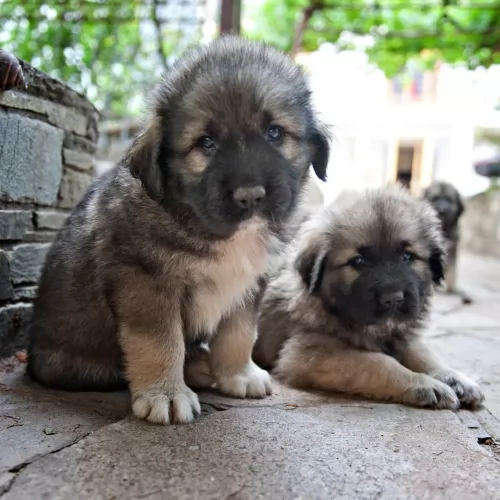 The Sarplaninac dog is a robust dog but he can suffer from health issues such as hip dysplasia, obesity, bloat, ear infections and skin allergies.
The Sarplaninac dog is a robust dog but he can suffer from health issues such as hip dysplasia, obesity, bloat, ear infections and skin allergies.
When your dog gazes up at you with such love in his eyes, don’t be tempted to pop some chocolate into his mouth or let him finish off your ice-cream. Treats like this can damage your pet’s health and give him heat intolerance, breathing difficulties, hypertension, liver disease and diabetes.
 Vlcaks have been specifically bred for stamina and if you neglect to exercise him, he’ll become bored and frustrated and possibly destructive and aggressive. He must be trained and he must be constantly provided with lots of exercise and activities.
Vlcaks have been specifically bred for stamina and if you neglect to exercise him, he’ll become bored and frustrated and possibly destructive and aggressive. He must be trained and he must be constantly provided with lots of exercise and activities.
Because of the wolf side of this dog, Czechoslovakian Wolfdogs have a high prey drive, so he will need to be trained and socialized if you want him to get along with your other pets in the home.
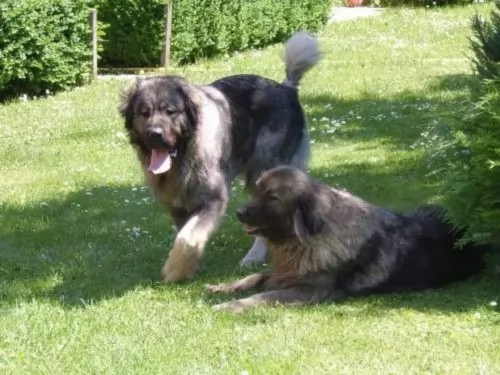 Every dog needs care from puppyhood through to old age.
Every dog needs care from puppyhood through to old age.
Šarplaninacs are looked upon as medium maintenance dogs. The coat is long and thick and requires a firm bristle brush to get their hair brushed.These dogs are moderate shedders so a brush twice a week will do the trick to keep the hair free of loose hair and matting.
Because these dogs have floppy ears, they will need to be checked and cleaned. Floppy eared dogs battle with moisture and wax build-up that increases the likelihood of ear infections.
Check the eyes that they are clear and free of discharge. Eyes with a lot of discharge can be indicative of health problems.
Check for any unusual lumps as cancer often starts with a new lump.
Provide your pet with a nice warm, dry place to sleep.
Keep his vaccines up to date to prevent deadly canine diseases.
Have him or her spayed or neutered if you don’t want puppies. These are regular procedures for a vet and offers health benefits for the dog. Neutering a male improves his character and keeps him from roaming. These dogs are capable of having 3 – 8 puppies.
The Sarplaninac requires decent food if he is to remain healthy. Dog’s stomachs can become upset if they eat all kinds of sweet and spicy human foods.
Commercially manufactured dog food is a good backup food to have because of its convenience. Try to include some home-made food. Simply add into one big pot chicken, brown rice or pasta and spinach, sweet potatoes and carrots. This food can all be chopped up and added in to the dry kibble twice a week. Give this to your pet twice a week and see how his tails wags when he smells it.
Also try to add in some raw meat to his food occasionally.
Ensure there is always a bowl of fresh, cool water within his reach.